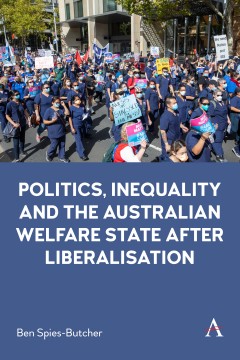Politics, Inequality and the Australian Welfare State After Liberalisation
By Ben Spies-Butcher
Anthem Studies in Australian Politics, Economics and Society
Other Formats Available:
- About This Book
- Reviews
- Author Information
- Series
- Table of Contents
- Links
- Podcasts
About This Book
Neoliberalism has transformed work, welfare and democracy. However, its impacts, and its future, are more complex than we often imagine. Alongside growing inequality, social spending has been rising. Politics, Inequality and the Australian Welfare State After Liberalisation asks how we understand this contradictory politics and what opportunities exist to create a more equal society. It argues an older welfare state politics, driven by the power of industrial labour, is giving way to political contests led by workers within the welfare state itself. Advancing more equal social policy, though, requires new forms of statecraft, or ways of doing policy, as well as new models of organising.
Drawing on examples of social policy change since the 1980s, the book explores how seemingly similar reforms reflect distinct political dynamics and facilitate different social outcomes. The examples reflect the main aspects of liberalisation – conditionality of benefits, marketisation of services and financialisation of the life course. Across each domain, it identifies examples that fit the ‘neoliberal’ frame and alternatives that appear to subvert it. From family payments to Medicare, social protection advanced using remarkably similar policy tools to those associated with liberalisation. The book identifies two competing welfare state projects. A ‘dual welfare state’ of hidden subsidies to privatised welfare alongside increasingly residualised public systems that stigmatise recipients, and a 'hybrid’ model of marketised universalism that uses novel forms of statecraft to socialise risk while advancing competition.
Rather than explaining how Australia fell prey to neoliberalism, the book identifies an ongoing struggle between competing visions of liberalisation. Dual welfare deepens inequality by concealing the distributional effects of state policy, building a sizeable coalition of largely older voters, insulated from the insecurities of precarious work and benefiting from rising house prices. Hybrid policies, it argues, emerged at the intersection of sympathetic bureaucracies and strong social pressure. Central to both are workers within the welfare state and the unions that represent them. The analysis recasts divides based on generation and education as reflecting the increasingly central role of social reproduction within the paid economy, and the strategies of care workers to have their skills and value recognised. The analysis opens opportunities for new models of solidarity based on an ethic of care.
Reviews
Progress in Political Economy (PPE)
Macquarie University Economics Society Podcast
"For all of us working towards a fairer world, where those excluded from mainstream labour can be helped to survive, where we untangle our capacity to live from our capacity to sell our labour, Ben Spies-Butcher has given us a tremendous resource. Charting how we got here, through the history of marketised welfare and financialised lives, this excellent book helps us understand how we can challenge this destructive system. It will provoke important conversations" — Tim Hollo, Author of "Living Democracy: an ecological manifesto for the end of the world as we know it" and Executive Director of The Green Institute.
Author Information
Ben Spies-Butcher is an Associate Professor of Economy and Society at Macquarie University. He has published and commented widely on Australian politics, economics, and inequality.
Series
Anthem Studies in Australian Politics, Economics and Society
Table of Contents
Tables and Figures; Prelude; Chapter 1 Politics Reconstructed; Chapter 2 Liberalisation in Australia; Chapter 3 Residualising Welfare; Chapter 4 Marketising Welfare; Chapter 5 Financialising the Life Course; Chapter 6: Hybrid Policy Making; Chapter 7: Challenging Liberalised Welfare; References; Index
Links
Stay Updated
Information
Latest Tweets



